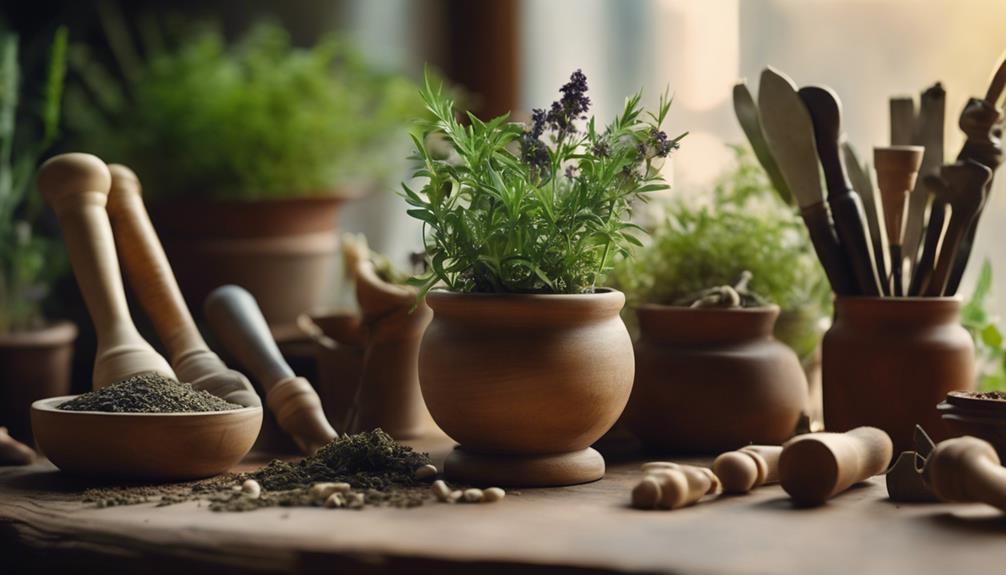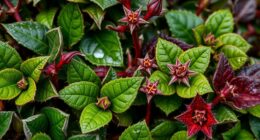As we explore the domain of healthcare, we're witnessing a significant shift towards a more holistic approach, with clinical herbalism emerging as an essential component in the pursuit of thorough wellness. This approach focuses on treating the whole person, not just symptoms, using custom herbal blends for specific health concerns. Clinical herbalists create personalized formulas, empower individuals to take control of their health, and identify root causes of health issues. They integrate herbal medicine with other interventions, acknowledging the interconnectedness of physical, emotional, and spiritual well-being. As we venture further, we'll uncover more about the role of clinical herbalists and their impact on public health.
Key Takeaways
• Clinical herbalism involves a holistic approach to health, focusing on treating the whole person, not just symptoms, with medicinal plants.
• Clinical herbalists create personalized herbal formulas, empowering individuals to take control of their health and identifying root causes of health issues.
• Integrating herbal medicine into clinical practice bridges the gap between traditional and evidence-based medicine, providing personalized treatments and complementing conventional care.
• Challenges in clinical herbalism include legal limitations, continuing education, and prioritizing client relationships, problem-solving skills, and legal boundaries.
• Pursuing a career in clinical herbalism offers opportunities in private practice, wellness centers, and leadership roles, making a meaningful impact on public health and wellness.
Understanding Clinical Herbalism
As we explore the world of clinical herbalism, it's important to understand that this holistic approach to health involves working with medicinal plants to support overall well-being and healing.
In this practice, herbalists take a thorough approach, focusing on treating the whole person, not just symptoms. This involves understanding the unique needs of each individual and prescribing custom herbal blends to address specific health concerns.
In clinical practice, herbal medicine can be a safe, powerful, and effective way to resolve health issues. We've learned that training in clinical herbalism requires a strong foundation in anatomy, physiology, herb-drug interactions, and herbal formulation skills.
By combining this knowledge with a deep understanding of herbal energetics, clinical herbalists can create personalized treatment plans that support optimal health.
As we explore further into the world of clinical herbalism, it's important to recognize the significance of a well-trained herbalist who can provide expert guidance and support throughout the healing process.
The Role of a Clinical Herbalist

We often find that a clinical herbalist's role is multifaceted, encompassing not only the creation of personalized herbal formulas but also the empowerment of individuals to take control of their health and well-being. As trained professionals, we work with clients to identify the root causes of their health issues, rather than just treating symptoms.
This involves integrating herbal medicine with other health interventions to support the body's natural healing processes. In our clinical application of herbs, we consider potential herb-drug interactions to guarantee safe and effective treatment. By taking a holistic approach, we help individuals understand the benefits of herbal medicine and make informed decisions about their health.
Our role extends beyond prescribing herbal remedies; we educate clients on healthy lifestyle choices, nutrition, and stress management. By empowering individuals, we enable them to take an active role in their health and well-being, leading to better health outcomes.
Integrating Herbal Medicine Into Practice

By incorporating herbal medicine into modern healthcare practices, we can provide a more all-encompassing approach to wellness, one that bridges the gap between traditional and evidence-based medicine.
As clinical herbalists, we recognize the value of integrating herbal medicine into clinical settings. This integration allows us to provide personalized herbal treatments tailored to individual needs, offering additional treatment options for various health conditions.
In a clinical setting, we can work closely with clients to create customized herbal remedies that complement conventional treatments. By doing so, we can provide a more holistic approach to healthcare, one that acknowledges the interconnectedness of physical, emotional, and spiritual well-being.
As we move forward, conducting evidence-based research remains crucial to further validate the effectiveness of integrating herbal medicine into clinical practice. Through this, we can ensure that clinical herbalism becomes a valued component of modern healthcare, providing patients with a more thorough approach to health and wellness.
Challenges in Clinical Herbalism

While clinical herbalism offers a wealth of benefits, it's not without its challenges, and maneuvering through the complex landscape of regulations, education, and client relationships is essential to successful practice.
As clinical herbalists, we face legal limitations on diagnosing and treating diseases without a medical license, making it important to navigate state regulations and advocate for legislative protection to guarantee safe and ethical practice.
Additionally, continuing education is crucial to stay updated on health research and broaden our herbal knowledge. Building a professional network is also necessary for tackling complex cases and collaborating with specialists to enhance our herbal skills.
Moreover, we must prioritize client relationships, problem-solving skills, and adherence to legal boundaries to navigate the complexities of the field. By acknowledging these challenges, we can work towards integrating herbal medicine into clinical practice, ultimately providing thorough care that combines the best of both conventional medicine and herbal remedies.
Pursuing a Career in Clinical Herbalism

As we start on a career in clinical herbalism, we'll discover a field ripe with opportunities for making a meaningful impact on public health and wellness. By pursuing a career in this field, we can help individuals achieve peak health through the use of herbs and herbal medicine.
The prospects are promising, with 75% of graduates employed or self-employed within a year, often taking on leadership roles in the herbal industry. We can explore various employment opportunities in private practice, wellness centers, and herbal product research, making a difference in people's lives.
The increasing usage of herbal supplements highlights the relevance of clinical herbalism, and we can be part of this growing movement. By combining our passion for herbs and health, we can create a fulfilling practice that contributes to the greater good.
With a career in clinical herbalism, we can build a portfolio that encompasses multiple aspects of the herbal industry, making a lasting impact on public health and society.
Frequently Asked Questions
What Is the Clinical Use of Herbal Medicine?
We use herbal medicine in a clinical setting to address specific health goals and promote healing. By creating custom formulas, we support physical, mental, and emotional well-being.
We match individuals with effective herbs using herbal energetics, focusing on treating the whole person, not just symptoms. This approach accelerates healing, resolves chronic issues, and complements traditional treatments.
What Is the Difference Between a Clinical Herbalist and a Herbalist?
We often get asked what sets clinical herbalists apart from herbalists. The key difference lies in their approach and expertise.
Herbalists typically provide general advice on herbal remedies, whereas clinical herbalists have advanced training, allowing them to create customized blends and treat clients with specific health concerns. They focus on the whole person, considering physical, mental, and emotional aspects of health, and often work alongside other healthcare professionals.
What Are the Contributions of Herbalists?
We herbalists contribute to personalized healthcare by crafting customized herbal formulations tailored to individual needs.
We address root causes of health issues through holistic approaches, considering physical, mental, and emotional well-being.
By educating clients on safe and effective herb use, we empower them to take charge of their health.
Our expertise complements traditional medicine, providing additional healing and wellness options.
What Is a Clinical Functional Herbalist?
As we explore the world of holistic health, we find ourselves asking: what's a clinical functional herbalist?
Fundamentally, they're skilled practitioners who fuse traditional herbal knowledge with modern clinical practices. By pinpointing underlying imbalances, they craft personalized herbal formulas to support overall wellness.
Working in clinical settings, they provide specialized care, focusing on the whole person, not just symptoms.
Conclusion
As we conclude our exploration of clinical herbalism, we're reminded of the powerful role it can play in modern healthcare.
Take, for instance, the case of a 35-year-old patient with chronic anxiety who, under the care of a clinical herbalist, found significant relief through a customized blend of passionflower and kava.
By integrating herbal medicine into their practice, healthcare providers can offer patients a more holistic approach to wellness.
As the demand for natural therapies grows, it's essential we continue to explore the vast potential of clinical herbalism.










